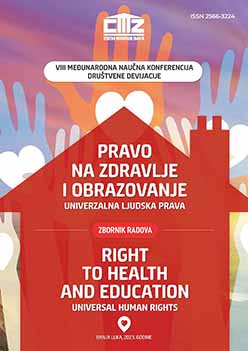ЗАСТУПЉЕНОСТ ИСКУСТВЕНОГ УЧЕЊА У УНИВЕЗИТЕТСКОЈ НАСТАВИ ИЗ УГЛА СТУДЕНАТА
REPRESENTATION OF EXPERIENTIAL LEARNING IN UNIVERSITY TEACHING FROM THE STUDENTS' POINT OF VIEW
Author(s): Branka KovačevićSubject(s): Education, Sociology, Higher Education , Sociology of Education, Pedagogy
Published by: CENTAR MODERNIH ZNANJA
Keywords: experiential learning; university teaching; knowledge; student;
Summary/Abstract: Experiential learning can be defined as a continuous process of critical evaluation of one's own or other people's experience through cyclical transformation (concrete experience, reflective observation, conceptualization, active experimentation) of previous experience and the interaction of the person and the environment that leads to the acquisition of new knowledge. In the paper's theoretical part, we discussed experiential learning's characteristics in university teaching. Experiential learning is not passive but active learning, testing ideas and assumptions in practice. The experiential learning model puts the learning process in the center - learning from experience, and at the same time, we should not ignore the fact that not every experience is learning. The research aimed to determine and analyze the level of students' assessment of the representation of experiential learning in university teaching, as well as the existence of a statistical difference in the assessment of the representation of experiential learning in university teaching of social sciences, humanities, natural sciences, engineering and technology. The research was conducted on a sample of 321students at the University of East Sarajevo. For the research, a scale for assessing the representation of experiential learning in university teaching (Likert scale) was constructed. Based on the obtained results, it can be stated that among the students of study programs of social sciences, humanities, natural sciences, engineering and technology there are differences in the assessment of the representation of experiential learning, i.e. experiential learning dominates in the segments related to the connection of previous experience with the content to be acquired. The basis of university teaching cannot be a sporadic experience in which life information has not been experienced and which has no value for the student. Therefore, it is significant to encourage students to acquire knowledge through personal experience and discovery, i.e. education is much more than imparting information and applying multiple teaching styles. Modern university teaching presupposes a greater representation of examples and practical models of the content being learned, i.e. a holistic approach based on the integrity of knowledge. Proponents of changes in university teaching expect modern education to be based on progressivist tendencies, i.e. placing an imperative on the principles of experiential learning.
Journal: DRUŠTVENE DEVIJACIJE
- Issue Year: VIII/2023
- Issue No: 8
- Page Range: 317-325
- Page Count: 9
- Language: Serbian

